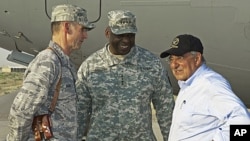U.S. Secretary of Defense Leon Panetta says the United States is very concerned about Iran providing weapons to militants in Iraq, as he prepares to meet with Iraqi leaders about the future of U.S. troops in the country.
Panetta told a group of U.S. soldiers in Baghdad Monday that the U.S. cannot allow the arming of Iraqi insurgents to continue, and will address the situation directly.
U.S. officials accuse Iran of supplying Shi'ite militiamen with weapons that killed most of the 15 U.S. troops killed in June. It was the deadliest month for U.S. forces in Iraq in two years.
Panetta is scheduled to meet with Iraqi leaders, including Prime Minister Nouri al-Maliki, and press them to decide whether they want U.S. troops to remain in the country beyond a deadline set for the end of this year. He will also urge the leaders to do more to fight the Shi'ite militias.
The United States is due to withdraw its remaining 46,000 soldiers from Iraq by December 31 under a 2008 agreement with the Iraqi government. But U.S. and Iraqi officials have expressed concern about the ability of Iraqi government forces to cope with security after the pullout.
President Jalal Talabani says Iraq's political parties will decide within two weeks whether to ask the United States to keep some troops in Iraq after the deadline.
One faction in Maliki's Shi'ite-led government already has expressed opposition to such a move - the political bloc of radical anti-American cleric Moqtada al-Sadr.
Meanwhile, Iraqi officials say three rockets hit Baghdad's fortified Green Zone Monday, but no casualties were reported.
On Sunday, the United States opened a consulate in Iraq's semi-autonomous Kurdish region in an effort to lure more American investors to one of the most stable and dynamic regions of the country.
To coincide with the opening, Marriott signed an agreement with Kurdish officials for a 200-room hotel and 75 executive apartments in Irbil to be built over a three-year period.
Some information for this report was provided by AP and Reuters.




